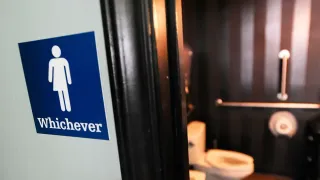
6 hours ago
Amid New Federal Report, Conversion Therapy Persists Across U.S. Despite Widespread Bans
READ TIME: 3 MIN.
A comprehensive new report from the Movement Advancement Project (MAP) reveals that while 23 states and the District of Columbia have enacted laws protecting minors from conversion therapy, the practice remains a persistent threat for LGBTQ+ youth in the United States . Conversion therapy, sometimes referred to as sexual orientation and gender identity change efforts (SOGICE), includes a range of practices aimed at suppressing or altering an individual’s sexual orientation or gender identity—practices that major medical associations have repeatedly condemned as ineffective and harmful .
Despite increasing legal protections, MAP’s report details a complex landscape of state and local laws, lawsuits challenging existing bans, and new legislative efforts seeking either to restrict or expand access to these practices. Four additional states and Puerto Rico have enacted partial restrictions, but in many parts of the country, especially in regions without explicit protections, LGBTQ+ youth remain vulnerable .
The report’s release follows a controversial review by the U.S. Department of Health and Human Services (HHS) in April 2025, which has drawn criticism from medical and LGBTQ+ advocacy groups for its treatment of conversion therapy under the rebranded term “exploratory therapy.” Critics, including The Trevor Project, warn that this language obscures the reality of conversion therapy and risks legitimizing a practice that has been widely discredited by every major medical association in the country .
Casey Pick, Director of Law and Policy at The Trevor Project, stated, “This report not only rejects health care best practices for transgender people—it goes a step further by recommending conversion therapy, though under a new, rebranded name, ‘exploratory therapy.’ Despite the report’s claims, this is, in fact, the same harmful practice of conversion therapy, just using friendlier language” .
The HHS report’s stance has intensified the ongoing debate over LGBTQ+ youth health care and prompted renewed calls from advocates for stronger federal protections and clearer guidance that aligns with established science and medical best practices .
Decades of research and the positions of leading medical organizations—including the American Academy of Pediatrics, American Psychological Association, and American Medical Association—underscore that conversion therapy offers no proven benefit and poses significant risks to mental and physical health . A 2024 nationwide study led by Stanford Medicine found that LGBTQIA+ individuals who experienced conversion practices reported significantly higher rates of depression, post-traumatic stress disorder, and suicidal thoughts compared to those who had not . The study also highlighted that the most severe mental health consequences were observed in people exposed to attempts to change both sexual orientation and gender identity.
Further, a 2025 cohort study published in JAMA Network Open reported associations between conversion therapy exposure and increased risk of cardiovascular health issues, including higher blood pressure, systemic inflammation, and a greater likelihood of hypertension diagnoses . These findings reinforce the urgent need for robust enforcement of existing bans and a shift toward affirming care approaches for LGBTQ+ youth.
The MAP report documents not only legislative victories for LGBTQ+ advocates but also ongoing legal challenges and new bills that threaten to roll back protections or introduce loopholes for conversion practices . As of June 2025, several lawsuits are pending that seek to overturn state bans or challenge the scope of existing laws, while some state legislatures have introduced bills that would allow or even mandate “exploratory therapy” for minors questioning their gender identity.
Advocates stress that while laws are essential, they are not alone sufficient to protect LGBTQ+ youth. Many young people still encounter conversion therapy through unlicensed practitioners, faith-based organizations, or informal community settings. According to recent polling by KFF, 25% of transgender adults report attending religious services that attempted to change their sexual orientation or gender identity .
The Trevor Project’s 2024 U.S. National Survey on the Mental Health of LGBTQ+ Young People found that 90% of LGBTQ+ youth said recent politics negatively impacted their well-being, with nearly half of transgender and nonbinary youth reporting that their families have considered moving due to anti-LGBTQ+ policies .
With conversion therapy continuing to pose a risk even in states with bans, advocates and medical professionals are calling for comprehensive federal legislation, stronger enforcement of existing laws, and a unified public health message denouncing all forms of conversion practices. Organizations such as MAP, The Trevor Project, and Stanford Medicine urge policymakers to prioritize evidence-based, affirming care for LGBTQ+ youth and to reject any attempts to repackage conversion therapy under new terminology.
At the heart of these calls is the belief that every LGBTQ+ young person deserves acceptance, support, and the freedom to live authentically without fear of coercion or harm. As the national conversation continues, the voices of survivors, medical experts, and advocates remain central to ensuring that progress is not only preserved but expanded for all LGBTQ+ individuals .






